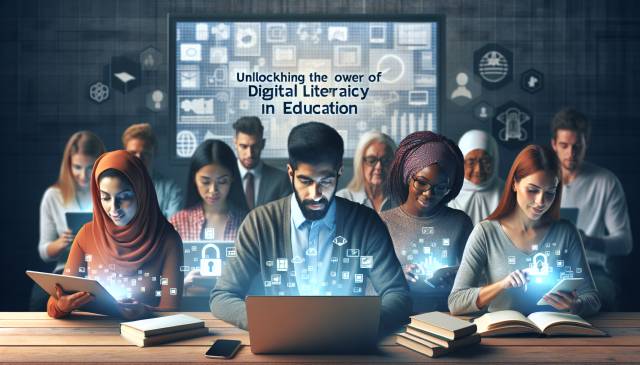
In todayâs fast-paced world, digital literacy has become an essential skill for learners of all ages. As technology continues to evolve, the ability to navigate the digital landscape is no longer optional but a necessity. This post explores the significance of digital literacy in education and offers insights on how learners can enhance their skills to thrive in the 21st century.
What is Digital Literacy?
Digital literacy encompasses a range of skills that allow individuals to effectively use digital technologies to find, evaluate, create, and communicate information. It includes the ability to:
- Understand and use digital tools and platforms
- Evaluate the credibility of online sources
- Create and share content responsibly
- Protect personal information and privacy
- Collaborate and communicate effectively in digital environments
Why is Digital Literacy Important?
Incorporating digital literacy into education is crucial for several reasons:
- Preparation for the Workforce: Most careers today require a certain level of digital proficiency. Employers seek candidates who can adapt to new technologies quickly.
- Enhanced Learning Opportunities: Digital literacy opens doors to a wealth of online resources, including e-books, academic journals, and interactive learning platforms.
- Critical Thinking Skills: Evaluating information from various sources encourages learners to think critically and make informed decisions.
- Global Connectivity: Digital literacy promotes collaboration and communication with peers worldwide, fostering a global perspective.
How to Improve Your Digital Literacy Skills
Improving your digital literacy skills is a continuous process. Here are some effective strategies:
- Take Online Courses: Enroll in courses that focus on digital skills. Many educational institutions offer free or low-cost options.
- Practice Regularly: The more you use digital tools, the more proficient you will become. Engage with various technologies in your daily life.
- Stay Informed: Follow technology blogs, podcasts, and webinars to keep up with the latest trends and tools.
- Join Online Communities: Participate in forums and social media groups dedicated to digital literacy. Sharing experiences can enhance your learning.
- Seek Feedback: Collaborate with peers and seek constructive feedback on your digital projects to improve your skills.
Challenges in Achieving Digital Literacy
While the importance of digital literacy is clear, several challenges can hinder learners:
- Access to Technology: Not everyone has equal access to digital devices and reliable internet, creating disparities in learning opportunities.
- Rapid Technological Changes: The fast pace of technological advancements can be overwhelming, making it difficult for learners to keep up.
- Fear of Technology: Some individuals may experience anxiety or fear when using new tools, which can hinder their willingness to learn.
The Role of Educators in Promoting Digital Literacy
Educators play a vital role in fostering digital literacy among students. Here are some approaches they can adopt:
- Integrate Digital Tools into the Curriculum: Use technology as a tool for learning, not just as an add-on.
- Teach Critical Evaluation Skills: Educators should guide students on how to assess the credibility of online information.
- Encourage Collaboration: Implement projects that require students to work together using digital platforms.
Conclusion
Digital literacy is a cornerstone of modern education that empowers learners to succeed in an increasingly digital world. By understanding its importance and actively working to improve their skills, students can unlock endless possibilities for personal and professional growth. Whether you are a student, educator, or lifelong learner, embracing digital literacy will lead to a more informed and connected future.
